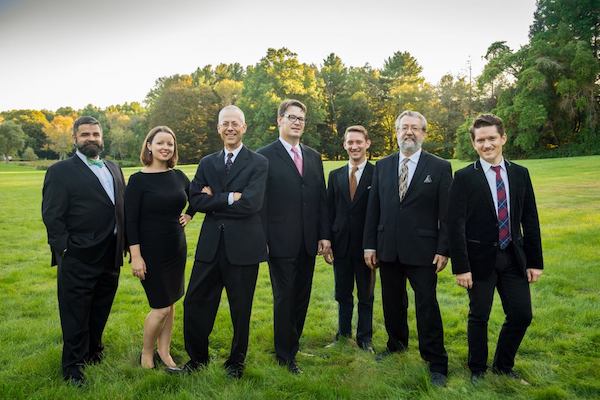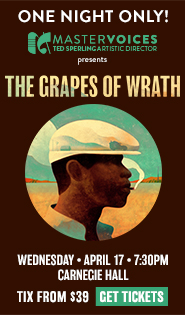Blue Heron brings earthy elegance to German Christmas music at Corpus Christi

Winter has come, and Christmas is fast upon the earth. The last Sunday before the day itself Music Before 1800 presented a concert of 16th and early 17th century music for Advent and Christmas, played at Corpus Christi Church by the vocal and instrumental ensemble Blue Heron. The Boston-based group was augmented by the Dark Horse Consort, a quintet of trombonists and cornettists—not the brass instrument, but the horn-shaped oboe precursor (“cornetto” means “little horn”).
The program wrapped instrumental music around vocal works by Michael Praetorius. Praetorius was a leading figure in German music of the late Renaissance, and if his name, like those of so many composers of that era, is not immediately familiar then certainly some of his tunes are. The order of the program framed, at the end, Christmas choral works, including the exquisite Es ist ein Roess entsprungen and the joyous beauty of In dulci jubilo.
Led from the violin and conducted by Scott Metcalfe, Blue Heron’s vocal sound cultivates a fine balance between elegant phrasing and exact articulation with a blunt, grainy timbre. Their clarity and earthiness were excellent vehicles for music that always and still has a social purpose. Listeners came to Corpus Christi for a concert in a church, while the music was, of course, originally meant to be heard there as part of a service, sung by local choristers.
The concert opened with an instrumental Sonata prima a 7 by Giovanni Battista Grillo, then mixed Pierre-Francisque Caroubel’s Passameze pour les cornetz and the Padouana & Gagliarda, Suite no. 13 by Johan Hermann Schein, with Praetorius.
Though the Dark Horse Consort’s instrumental playing never seemed to find a consistent pulse, that was mitigated by the wonderful sound of the mellow trombones and the nasal, throaty cornettos—the kind of bracing, unusual colors that alone justify the early music movement. The singing had a sharper rhythmic profile, an uncommon experience.
In the first half, which offered music for Advent, the instrumentals added a formal mood to Praetorius’ expectant settings of Nun komm, der Heiden Heiland, three such for four, six, and eight voices, and more formal, worshipful pieces like Attollite portae capita vestra and the Magnificat super angelus ad pastores. The last was made antiphonal with voices singing from the back balcony, making for a vibrant performance.
Perhaps the second half simply offered better music, but the Christmas pieces heard after intermission left a stronger impression.
Gabrieli’s Canzon XIV, a10, played by the combined instrumental forces of Blue Heron and Dark Horse Consort, announced the Christmas music, and it was a pleasure to hear Gabrieli played with more intimacy and less fanfare. The musicians also played his Canzon primi toni, a10, and between those Blue Heron delivered a short, lush set of vocal music from Samuel Scheidt; Duo seraphim, Puer natus in Bethlehem, and Gelobet seystu, Jesu Christ. In a nice touch, the two seraphim were also in the balcony, their voices floating above the listeners.
These were shining performances that set the contrast for Praetorius, a medley that began with Es ist ein Rose and concluded with Singer und klinget. The force and directness of this music were refreshing. In contrast to the ethereal complexity of 16th century vocal polyphony, Praetorius, as heard in these pieces, worked in a way that was closer to song and the modern idea of choral music.
The full-bodied singing had one thinking that the combination of Praetorius being self-taught and his Lutheranism made for instincts closer to the heart of feeling than the mysteries of faith. In the Catholic setting, his music made for a truly ecumenical holiday celebration.
Sequentia performs “Charms, Riddles and Elegies of the Medieval Northlands, 8th-11th Centuries” 4 p.m., January 19, at Corpus Christi Church. mb1800.org



